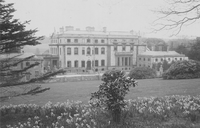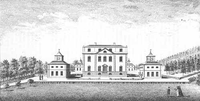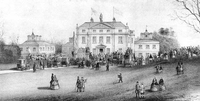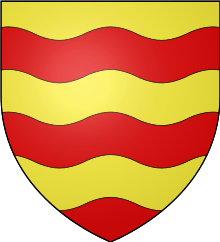Tehidy
Tehidy is an historic manor in the parish of Illogan in Cornwall, England, located on the north coast of Cornwall, far to the west of that county, about two miles north of Camborne, two miles west of Redruth, and about a mile south of the harbour at Portreath. The manor was a seat for many centuries of the junior branch of the Basset family which gained much wealth from local tin mining. 250 acres (1.0 km2) of the parkland and estate around the former mansion house is today open to public access as Tehidy Country Park, having been purchased by Cornwall County Council in 1983 and now being one of four country parks in Cornwall. The park's facilities include an events field, barbecue hire facilities in a specially designated woodland, outdoor education facilities, a permanent orienteering course and a schools and youth campsite.




House

The Basset family owned the estate from Norman times. They acquired the manor of Tehidy in the mid-12th century when William Basset married Cecilia, heiress of the House of de Dunstanville. Recorded as 'Tehidin' in the 12th & 13th centuries, its name is derived from the Cornish language 'ti', a house, and a personal name. By 1330, William Basset owned a substantial building but during the Cornish Rebellion of 1497 it was dismantled by rebels led by Richard Pendyne of Pendeen in revenge for the loyalty to the Crown shown by John Basset, then Sheriff of Cornwall.
In 1734 the building of a new mansion house was commenced by John Pendarves Basset and in 1739 Francis Basset took possession of the estate and the almost completed house. In 1861 John Francis Basset again commenced a rebuilding, funded by the income from mining and land rents. During 1860–61 his income from Dolcoath mine and the Basset mines amounted to £20,000. The house was completed by 1863. By 1888 Arthur Francis Basset had inherited the estate but because of diminished income from the mining industry it was difficult to finance the estate. In 1915 the mansion was vacated and after 700 years of Basset ownership, the estate was sold in 1916. In 1918 the house became a hospital for tuberculosis sufferers.[1] On 23 February 1919 the house was destroyed by fire but by January 1922 had been completely rebuilt.[2]
Country park
Within the boundaries of Tehidy Country Park, evidence of man's activities can be found dating back many centuries. In the woodland in the North Cliffs area is an ancient earthwork and in Oak Wood, earth banks that were field boundaries can still be seen. The Basset family obtained the manor of Tehidy in the mid-12th century and today's landscape is the result of their activities. Many features created by the Bassets have now disappeared but some relics of the estate can still be seen.[2]
Flora and fauna
The woodland at Tehidy is composed of distinct vegetation layers. Trees such as Ash, Alder, Oak, Beech, Sycamore, Birch, Japanese Maple, Conifers and Chestnut are the tallest, most dominating trees, followed by lower growing shrubs including Holly and Hazel. Typical woodland plants such as Bluebells, Wild Garlic (Allium triquetrum), Daffodils and a range of native ferns inhabit the park as well as many different varieties of Rhododendron. The park is home to, amongst others, swans, geese, rooks, jackdaws, coots, moor hens, grey squirrels, otters and badgers.
Hospital
In the centre of the park, but now private property, is a large building which was once Tehidy Hospital (sometimes referred to as Tehidy Sanatorium). It was originally converted from the Bassets' home into an isolation hospital for patients with tuberculosis, but in later years also dealt with patients who had strokes, head injuries and various respiratory disorders. Like many old TB Hospitals there were several wards distributed throughout the extensive grounds and the operating theatre was refurbished in the early 1980s although was never reopened. Over the years most of the wards closed and finally the hospital shut completely in April 1988, and has now been converted into luxury apartments. Several new luxury houses have now been built around the former hospital buildings. There is no public right of way through this section of the park.
Basset family lineage

Senior line
The Heraldic Visitations of Devon gives the Basset lineage thus:[3]
- William I Basset of Ippesden, Oxfordshire, was the son of John I Basset of Ippesden.[4] He married Cecilia de Dunstanville[4] and obtained Tehidy Manor c. 1150[2]
- Alan I Basset (son), married Lucia Peverell, from whom he inherited the Devon manor of Whitechapel[4]
- Alan II Basset, (son) married the daughter of Sir Andrew Haccombe.[4]
- Sir Lawrence Basset, (son) married Hawisia Mallet, daughter of Sir Ralph Mallet.[4]
- William II Basset (d. 1304) (son) of Tehidy, married Alice Wallis, daughter of Sir John Wallis.[5]
- Sir William III Basset (1300–1340) (son). Sheriff of Cornwall 1312, 1332 and 1334.[5] On 23 July 1330 a licence to crenellate Tehidy was granted by the king to Willielmus Basset.[6][7] He married Johanna de Bottreaux, daughter of Sir William de Bottreaux.[5]
- Sir William IV Basset (d. 1384) (son), married Margaret Fleming, daughter of Sir Simon Fleming.[5]
- John II Basset (1374–1463) of Tehidy, (son), Sheriff of Cornwall 1449, married Johanna Beaumont, daughter of Sir Thomas Beaumont and heiress of Umberleigh and Heanton Punchardon in Devon.
- Sir John III Basset (1441–1485) (son) of Tehidy, married Elizabeth Budockshyde, daughter of Thomas Budockshyde.[5]
- Sir John Bassett (1462–1529) (son) of Umberleigh, Sheriff of Devon 1524.[5]
- John Basset (1520–1542) (eldest son)
- Sir Arthur Basset (d. 1586) (son) of Umberleigh. He gave the manor of Tehidy to his uncle George Basset (d. 1580), MP for Bossiney[8]
Junior line
- George Basset (d. 1580), 2nd son of Sir John Bassett (d. 1529) of Umberleigh and Tehidy. He was MP for Bossiney in Cornwall. The manor of Tehidy was settled by deed of entail dated 26 March 1563 made by George's nephew Sir Arthur Basset (d. 1586) of Umberleigh, eldest son of his elder brother John Basset (d. 1541) of Umberleigh and Tehidy. The deed granted Tehidy to Arthur's grandmother Honor Plantagenet, Viscountess Lisle (d. 1566), for her life, then to her son George Basset and his wife Jaquet Coffin (d.1589) and the heirs male of his body.[9]

- James Basset, died 1603, son and heir. He inherited Tehidy under the above entail. He married Jane Godolphin, daughter of Sir Francis Godolphin. His monumental brass showing himself dressed in armour opposite his wife, with their ten children between, exists in Illogan Church, with the following inscription:[10]
"Here lyeth buryed the body of James Bassett Esquire who had to wife Jane Godolphin ye daughter of Sr Frauncis Godolphin, knight, haveinge 5 sonnes and 5 da'u'hers. He departed this life ye 8th day of February An'o 1603 beinge of ye age of 43 yeres"
- Sir Francis Basset, 1594–1645, Royalist and High Sheriff of Cornwall, 1642 (married Anne, daughter of Sir Jonathan Trelawny)
- John Basset, c. 1624–1661. MP for St Ives
- Francis Basset, died 1675.
- Francis Basset, 1674–1721. MP for Mitchell. High Sheriff of Cornwall, 1708.
- John Pendarves Basset, 1713–1739
- Francis Basset (1715–1769) MP for Penryn
- Sir Francis Basset, 1757–1835 (son was John Basset – MP for Helston)
- Frances Basset, 2nd Baroness Basset, 1751–1855
- John Francis Basset (1831–1869)
- Arthur Basset (1833-1870)
- Gustavus Lambert Basset (1834-1888) – in 1872 Gustavus Basset of Tehidy Park was quoted as the fifth largest landowner in Cornwall with 16,969 acres (68.67 km2).[11]
- Arthur Francis Basset, born 1873 – moved to Crewkerne in 1915, then to the Lodge House of Hatfield House and later to London. Sold Tehidy in 1915.
References
- Bernard Walke was a patient here and during that time wrote his book Twenty Years at St Hilary.
- Tangye, Michael (1984) Tehidy and the Bassets. Redruth: Dyllansow Truran ISBN 0-907566-97-9
- Vivian, pp. 45–48, Basset pedigree
- Vivian, p. 45
- Vivian, p. 46
- "English Licences to Crenellate 1199 - 1567" (PDF). Castlestudiesgroup.org.uk. Retrieved 8 August 2016.
- Per Vivian, p.46: Licensed kernellare mansum suum de Tuthidy 4 Edward III (Patent Rolls 4 Ed III, membrane 10)
- Burke's Landed Gentry, 1937
- Dunkin, Edwin Hadlow Wise, The Monumental Brasses of Cornwall with Descriptive, Genealogical and Heraldic Notes, 1882, p. 60
- Dunkin, 1882, plate XLVIII
- Who Owns Britain ? by Kevin Cahill
Sources
- Vivian, Lt.Col. J. L., (ed.) The Visitations of the County of Devon: Comprising the Heralds' Visitations of 1531, 1564 & 1620, Exeter, 1895
External links
| Wikimedia Commons has media related to Tehidy. |